I was hoping to find a fossilised plesiosaur on the beach today, but it would have to have been a baby one if we wanted to carry it home. We did find a bunch of ammonites and bought back a few smaller samples.
Since we are visiting the “Jurassic Coast”, Felicity did some research and found that at Lyme Regis you are guaranteed to see fossils, and likely to find portable samples. It took about two hours by bus to get there, winding though the Dorset countryside along the southern coast of England. Many of the villages are made completely of stone so they are very picturesque.
Lyme Regis is another traditional seaside town, with a beach crowded with bright pink Brits, and a row of beach huts where you can make cups of tea and shelter from the wind and rain if the weather is normal.
It took us a little while to see our first fossil, but once we got the hang of it they were indeed everywhere. After a while a guided group came along so we latched on to them and learned a little bit about how the area developed. The coast was once about 40 miles inland, but the old seabed has been pushed up and as the cliffs erode more fossils appear.
By early afternoon we were satisfied and headed back to town, stopping to sample a small tub of whelks, which turned out to be largish sea snails and rather delicious with a bit of vinegar and black pepper. Then a long wait for the bus, and another two hour trip back to Weymouth.
I had been a bit apprehensive about finding something decent to eat for dinner. Weymouth has hundreds of places offering fish and chips, and one or two expensive and poorly patronised Italian and Indian restaurants, but not a lot else. Our accommodation includes a traditional breakfast of susages and bacon etc, so I was not keen on any food that had been cooked in a deep fryer.
In the end we found a poorly patronised but reasonably priced hotel to eat at, and had a very pleasant meal, followed by a walk along the promenade for a few kilometres while the evening grew dark. Tomorrow morning we are off back to London.

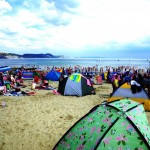
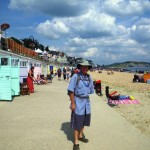
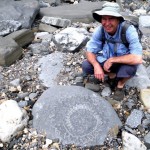
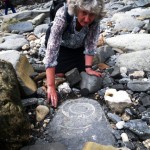
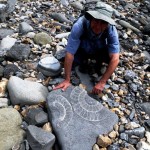
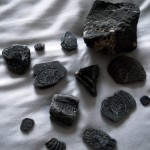
You did well to get your eye in for the smaller ones. Fascinating
A couple of those big ones would go down well in the garden! I’m surprised you are allowed to take them.
They fall off the cliffs, especially after rain, and then every high tide get washed out to sea. People are encouraged to collect them and if you find something unusual show it to them in the know (we mostly found bits of ammonite – exciting for us but not rare).
Am Am 1/2 way through the book “the french lieutenants woman” which is set in lyme regis, lots of desdescription of the various bays and surrounds. Have a good mental picture of your visit.. R